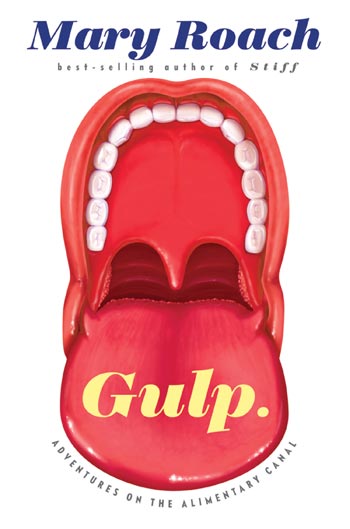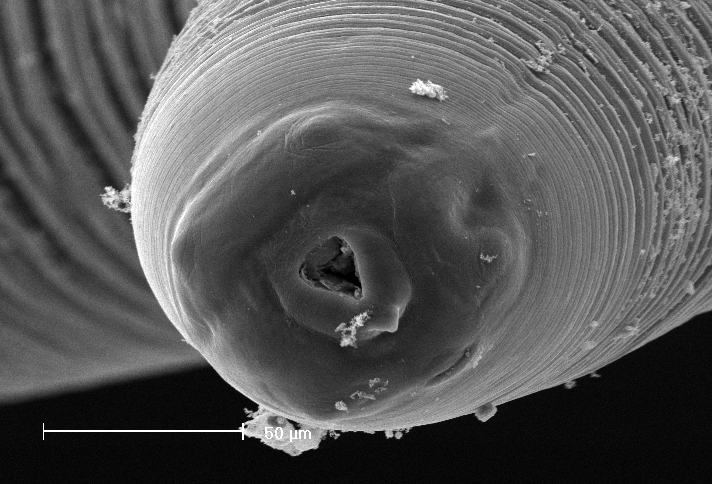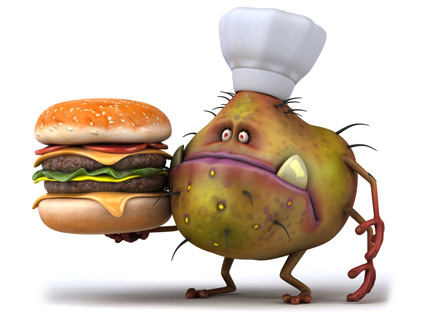
<a href="http://www.shutterstock.com/pic-126394745/stock-photo-kitten.html?src=AC_tpPCu6Sxdw5gkInch8g-1-4">Sorina Madalina Androne</a>/Shutterstock
Mary Roach has been called “America’s funniest science writer.” Master of the monosyllabically titled bestseller, she has explored sex in Bonk, corpses in Stiff, and the afterlife in Spook. Her latest book, now out in paperback, is Gulp: Adventures on the Alimentary Canal. It’s, you know, completely gross. But in a way that you can’t put down.
What kind of things might you learn in a Mary Roach book about the alimentary canal, that convoluted pipeline that runs from where you food goes in all the way to where something else comes out? Well, how about why suicide bombers don’t carry bombs in their rectums: Their bodies would absorb much of the explosion and prevent any chance of achieving their deadly objective. It’s one of the “reasons to be thankful for your anus,” observes Roach on this week’s episode of the Inquiring Minds podcast.
On the show, Roach took listeners on a quick tour of the colon and discussed some uses of the alimentary canal that are surely outside the normal range of advised behavior (just Google “hooping”—not the Hula Hoop kind—and you’ll see what we mean). But this isn’t all funny; the science of the gut can help you live more, er, comfortably. And there are also a lot of myths about the gut that need debunking. So—based partly on Roach’s reporting—here are some facts you need to know, and some nonsense you need to avoid, when it comes to your innards:

1. You are your bacteria. By now, most of us have heard the term “microbiome,” which denotes the magnitude and diversity of organisms with which we share our bodies. The state of your microbiome can keep you at the peak of health or send you deep into disease. And that’s especially the case in your guts—usually defined as the lower part of the alimentary canal, including the stomach and intestines—where your own cells are greatly outnumbered by foreign squatters.
“For every one cell of you, there are nine of them,” says Roach. “So as one of the gastroenterologists said to me, it’s kind of a philosophical question of who owns who.” And who those bacteria are seems to be pretty important: Get the wrong mix and you could experience diarrhea, embarrassing flatulence, stomach pain, and other nefarious symptoms. In fact, one of the possible side effects of taking antibiotics, which kill good bacteria as well as the bad bacteria causing whatever infection you’re trying treat, is a proliferation of Clostridium difficile, a species of intestinal bacteria that is normally kept in check by the other organisms with which it shares your colon. “Changing people’s bacteria is turning out to be a more effective strategy for treatment and prevention of disease than changing their diet,” writes Roach in Gulp.
So how do you get the right bacterial colony? Well, it may help to start out life with a trip down the birth canal. According to a 2006 study in Pediatrics, one-month-old infants who were delivered vaginally, fed breast milk exclusively, and had an older sibling had the healthiest gut flora, compared with those firstborns who were delivered by C-section and formula-fed. (For a much more in-depth discussion of how gut bacteria impact our health, and how they may be deeply involved in weight gain and loss, see this Mother Jones feature story from last year: “Are Happy Gut Bacteria Key to Weight Loss?“)
2. Seriously: Skip the cleanse. For hundreds of years, people have thought that their guts are “dirty,” filled with noxious substances that need to be eliminated. Today, many of us have been encouraged by a celebrity or a friend at some point to try a “detox” or cleansing diet. Some people go even further and pursue what is called a colonic cleanse: a more, shall we say, direct way to achieve the same goal.
But washing out your intestine will actually reduce your beneficial gut microflora, and potentially lead to even more discomfort. In fact, the Mayo Clinic lists several harmful side effects of colon cleanses, including dehydration, bowel perforations, infections, cramping, bloating, and vomiting. And as for dietary cleanses: Not only do these fail to show long-lasting results, but they might actually cause you to gain weight in the long run, as fasting tells your brain that there isn’t enough food in the environment and it’s time to slow down metabolism.

Then there’s the matter of these supposed “toxins.” Our kidneys, liver, and intestines are actually very efficient waste disposal factories and can rid your gut of toxins far more safely than any enema or cleanse. So why are so many people fans of the detox diet? Just like going to confession, going on a cleanse after a few indulgent days or weeks can alleviate feelings of guilt and shame. Early in a fast, many people experience a surge in endorphins, giving them a short-lived high. What’s more, often, the liquids in detox diets contain caffeine, giving you a burst of energy. Couple energy with a good mood and you feel instantly rewarded. Then, when you inevitably crash and overeat again, you berate yourself for not having the will power to stay the course, leading you to start another cycle.
3. Re-evaluate your probiotics. If you do have an imbalance in your gut microflora, you might not benefit that much from eating a serving of yogurt. That’s because of the sheer volume of bacteria that colonize your colon. Using over-the-counter probiotics to fix the problem just doesn’t scale. “The analogy somebody gave to me was it’s like trying to raise the sea level with a tea cup,” says Roach.
But rest assured, there is a potential cure, albeit one that might gross you out. “The ultimate probiotic,” says Roach, “is a fecal transplant” (supervised by an experienced and qualified doctor, of course). Yep, that’s right: Taking a healthy person’s waste and injecting it into your gut. But it’s not like you can use just anyone’s donation—successful transplants only come from well-tested and vetted donors. And it’s not just a little bit of waste that is used. It’s enough to require a full-size blender (and to change, forever, the connotation of a “smoothie”).
Why so much? “You’re creating, like, world war in the colon,” explains Roach. Conditions that are improved by fecal transplants require a near-complete recolonization of gut bacteria. You need to send in the full complement of troops.

4. Make sure your sushi was previously frozen. There have long been health taboos against eating raw fish. But according to Food and Wine magazine, the number of sushi bars in America quintupled between 1988 and 1998. So is there still a risk? One of the most disgusting intruders into our guts is a worm, of the genus Anisakis, that can be found in sushi. “There is a little tiny worm—I shouldn’t even tell anyone this,” said Roach in our interview. And then she did: “This little guy has on his head, it’s called a boring tool, it’s like an electrical drill on the head, and it drills through various components of the gastrointestinal system.” But rest assured it is illegal to serve sushi in the United States that has not been previously frozen, a process that kills the offensive nematode. Here’s a video of sushi with a worm in it: Warning, it’s kind of gross.
5. No, snakes and frogs cannot live inside you. For her book, Roach also investigated a variety of myths, legends, and old wives’ tales about organisms somehow managing to survive inside of people’s stomachs and intestines. The origins of these tales is usually the same: “People would have strange feelings of gurgling and movement inside them,” says Roach, “which is normal.” But some individuals would then convince themselves that because they had drunken from a stream, they’d swallowed a larvae or young organism that then grew larger inside their bodies. Here’s an 1864 New York Times report that takes a “snake in stomach” story seriously: “It became the incontrovertible opinion of the most skillful physicians, that the increasing difficulty has been the growth of a snake in the stomach.” And here’s a 17th-century story of a German woman who claimed to be vomiting frogs.
Needless to say, it’s all bunk. “There was one particular patient who claimed, ‘I have had a succession of frogs,’ and the doctor said, ‘Okay, let me see one of these frogs,'” says Roach. “And he cut open the frog, and he looked at what was in the frog’s stomach, and of course, there were some half-digested insects. Which led him to realize, ‘No you haven’t had a frog in your guts for years, because unless you’re also ingesting insects to feed the frog, this frog died outside of your body.’ I love that.”

6. The kitten cure for constipation: Cute, but no, it probably doesn’t work. From time to time, we’ve all experienced the unpleasant symptoms of constipation, especially when traveling. Because traveler’s constipation tends to resolve itself within a few days, it’s not a hot topic in the annals of medicine, though one recent study of Spanish adventurers found that 40 percent people reported lower rates of defecation during a trip from Madrid to Argentina.
We all know that exercising, drinking plenty of water, and eating fiber can help prevent constipation, but sometimes we need a little extra help. Sometimes, you really get what Roach calls “obstipation”: obstinate constipation. In truly serious cases, constipation can be a symptom of an impacted bowel: long-term constipation caused by a large, dry lump of feces that’s stuck in your colon. Then, in very rare cases, straining to push it out can kill you.
But as Roach reports in Gulp, English physician Thomas Sydenham, an “uncommonly gentle practitioner” from the 1600s, had other tips to manually disimpact a painful obstruction. One idea was to ride a horse. Another treatment “featured mint water and lemon juice, as if all that were needed to make a man right was a refreshing summertime beverage,” writes Roach. But the gentlest remedy of all of Sydenham’s suggestions? “I order too,” he continued, “that meanwhile a live kitten be kept continually lying on the naked belly.” It’s a serious long shot, but perhaps he hoped the instinctual kneading behavior of a kitten looking to nurse might jumpstart intestinal motility. As Roach notes, at least it might relax you. And certainly, of all the proposed treatments for impacted bowels, the kitten cure is most adorable.
Of course, this is not a scientific recommendation. It’s just funny. But it surely won’t do any harm. “I’d definitely start with the kitten, before you move on to Ex-Lax,” jokes Roach.
To listen to the full Inquiring Minds interview with Mary Roach, you can stream below:
This episode of Inquiring Minds, a podcast hosted by neuroscientist and musician Indre Viskontas and best-selling author Chris Mooney, also features a discussion of whether humans differ, genetically, in our sensitivity to pain, and on the latest dismal survey showing just how much scientific knowledge Americans refuse to accept.
To catch future shows right when they are released, subscribe to Inquiring Minds via iTunes or RSS. We are also available on Stitcher and on Swell. You can follow the show on Twitter at @inquiringshow and like us on Facebook. Inquiring Minds was also recently singled out as one of the “Best of 2013” on iTunes—you can learn more here.















